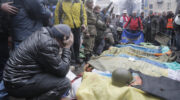Perseverance Europe
Odesa’s reply to Russian missiles: Unity, volunteerism, resolve
| View caption Hide caption
A Russian bombing campaign launched with Russia’s withdrawal from the Black Sea grain deal has targeted Odesa’s port and grain silos. But it has also targeted the Ukrainian city’s culture and heart. Odesans are unbowed.
“I am sure that all these people were just not able to wait until the curfew was over, to come here and help,” says Ms. Golubova, as tears form in eyes framed by a flower-print headscarf. “I can tell you our people are invincible.”
View caption Hide caption
Just the night before, she says, she had prayed for peace with a large congregation in this Transfiguration Cathedral, part of a UNESCO World Heritage site in the center of this Black Sea port city.
“I don’t understand what these people have in their heads,” says Ms. Golubova, when asked about the Russian missile impacts overnight Sunday. Of the 19 rockets that were launched, Ukrainian officials say nine were intercepted; of the remainder, one hit the church, and several struck historic buildings near the port.
“I can tell you that, for certain, my second home has been destroyed,” Ms. Golubova says of the cathedral, before stepping away to join the volunteers.
Russia in the past week withdrew from a deal negotiated a year ago by the United Nations and Turkey to allow safe passage in the Black Sea for Ukrainian grain exports, in exchange for the Russian sale – unencumbered by Western sanctions imposed after Russia’s invasion of Ukraine in February 2022 – of its own agricultural products and fertilizer.
View caption Hide caption
Russia complained it was not getting the promised access to global markets – a stance the U.N. and Western officials reject – and has now mined Ukraine’s Black Sea export routes and vowed that any ship attempting to come in or out of Ukraine will be targeted as an enemy vessel.
“First is the grain deal; they are shooting at the port facilities – this is the main target,” Odesa Mayor Hennadii Trukhanov says after surveying damage at the wrecked cathedral. “The grain deal is not just the paper on which it is signed. A lot of countries are relying on us, and I don’t think crew members and ship owners will risk their lives to send ships here if this will continue.”
The mayor says Russian strikes are the acts of “barbarians” who are also “striking at our culture” by hitting the UNESCO heritage zone – including this cathedral, where he worships. It is part of the Ukrainian Orthodox Church (Moscow Patriarchate), but the mayor says it has “tried to distance itself” from those ecumenical ties to Russia.
He quips that he has not slept for a week.
“Maybe they [Moscow leaders] finally realized that Odesa did everything to show that it is not a Russian city, as they think; maybe they even had some sweet fantasies about Odesa,” says Mr. Trukhanov, referring to reported Russian expectations at the outset of the war that Odesa would welcome the Russian invasion.
View caption Hide caption
“We have shown that not only are we not waiting for them here, but that our hatred grows with every missile,” says the mayor. “Every day, they show to the entire world that everything they say is a lie.”
On Sunday, UNESCO condemned Russia for its “brazen attack,” and said, “This outrageous destruction marks an escalation of violence against cultural heritage of Ukraine.” UNESCO noted, among damaged “significant” sites early Sunday, that the Transfiguration Cathedral was founded in 1794 and is Odesa’s first and foremost Orthodox church.
Outside his cathedral Sunday, Father Myroslav Vdodovych stands in his black priest robes as volunteers around him scrape broken glass off the pavement. He hands out water, puts on a hard hat to lead the mayor through the rubble, and attaches his phone – which has church bells ringing for a ring tone – to an external battery pack, to handle endless calls.
“The main thing is that everyone is alive,” says Father Myroslav. “For Odesa’s people, this cathedral is a traditional symbol of Odesa; it is a part of Odesa. So they were targeting the symbol, the heart of Odesa.”
View caption Hide caption
On a midday visit to this cathedral in March 2022, during an air raid siren early in the war, a Monitor reporter found three families with four children seeking sanctuary in an ornate underground room turned into a makeshift bunker. Many more were staying over each night.
“Our lives have become a life of being here or at home – we sleep in our clothes,” mother Kateryna Zadorozhnaya said at the time. On Sunday, when the Russian rocket landed, five people were in the undamaged shelter and survived.
“Odesa is a peaceful city,” says Father Myroslav. “The fact that [this strike] happened in the heart of the city says this is not a war. It’s pure terrorism; it’s inhumane.”
That was the view of Anatolii, a worker and chief ringer of the 15-ton bell at the cathedral. He rang the church bells that morning, in an act of defiance, and wore an orange hard hat as he inspected the damage before volunteers were allowed to enter.
View caption Hide caption
“Everything is going to be OK,” he says, as if reciting a catechism. He notes that the cathedral was destroyed by Josef Stalin in 1936, and the big bell fell to the ground. A new bell was installed when the cathedral was rebuilt in the early 2000s.
Among the volunteers cleaning up is Svetlana Gvozdikova, who uses a broom to sweep away gray dust and black ash from a fire. An ethnic Russian married to a Ukrainian, she wears a camouflage baseball hat with the words “Military Wife.”
The couple moved from Russia one year ago with their daughter, and Ms. Gvozdikova condemns Russia’s assault on Ukraine, saying she is “the right person” to confirm Russian President Vladimir Putin’s “criminal power.” She says her husband – who is a Ukrainian air defense officer in Odesa – speaks often of the need for U.S. Patriot air defense missiles, to thwart attacks like those on Odesa in the past week, “but they do the best they can with what they have.”
View caption Hide caption
“This is terrorism of civilians,” says Ms. Gvozdikova. “With their degraded minds, they think people will be afraid. But Ukrainians are not like that.”
She says she is not at all religious and didn’t personally know any of the other volunteers at the church. But, like many of those here, she chose to help where she could.
Ms. Gvozdikova was impressed by the hive of activity inside the devastated cathedral.
“This tells me that Ukraine has already won,” she says, “even though the war continues.”
Reporting for this story was supported by Oleksandr Naselenko.
Editor’s note: This article has been amended to correct the spelling of Father Myroslav Vdodovych’s given name.




